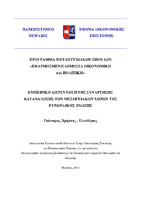Εμπειρική διερεύνηση της συνάρτησης κατανάλωσης των Μεσογειακών χωρών της Ευρωπαϊκής Ένωσης
Empirical investigation of the consumption function of the Mediterranean countries of the European Union

Master Thesis
Συγγραφέας
Γιάνναρος, Χρήστος - Ελευθέριος
Ημερομηνία
2023Επιβλέπων
Αγιακλόγλου, ΧρήστοςΠροβολή/
Λέξεις κλειδιά
Ακαθάριστο Εγχώριο Προϊόν ; Κατανάλωση ; Απλό γραμμικό υπόδειγμαΠερίληψη
Η εργασία αυτή διερευνά την οριακή ροπή προς κατανάλωση της συμμαχίας των επτά
κρατών μελών της Μεσογείου και της Νότιας Ευρωπαϊκής Ένωσης (MED7).
Αντικείμενο της είναι η εξέταση της συμπεριφοράς της κατανάλωσης όταν
μεταβάλλεται το εισόδημα κατά τη διάρκεια των ετών 2000 – 2020, καθώς και την
διερεύνηση βραχυχρόνιων και μακροχρόνιων συμπεριφορών μέσω χρονικών
υστερήσεων. Η παρούσα έρευνα πραγματοποιείται με τη χρήση οικονομετρικών
τεχνικών και θεωριών, στο λογισμικό υπολογιστικού φύλλου Microsoft Excel και στο
λογισμικό EViews12. Στα πλαίσια του εμπειρικού σκέλους της εργασίας
χρησιμοποιούνται ετήσιες παρατηρήσεις του Ακαθάριστου Εγχώριου Προϊόντος και
της Κατανάλωσης για τις χώρες: Γαλλία, Ελλάδα, Ισπανία, Ιταλία, Κύπρο, Μάλτα,
Πορτογαλία. Τα στοιχεία που χρησιμοποιήθηκαν καλύπτουν μια περίοδο από το 2000
μέχρι το 2020 και συλλέχθηκαν από τη βάση δεδομένων World Development
Indicators (WDI), της World Data Bank.
Από τα εμπειρικά αποτελέσματα της μελέτης για το σύνολο των χωρών που
εξετάστηκαν προέκυψε ότι υπάρχει μικρή διαφορετική συμπεριφορά στην οριακή ροπή
προς κατανάλωση στις Μεσογειακές χώρες της Ευρώπης, με εξαίρεση την περίπτωση
της Μάλτας όπου εμφανίζει πολύ μικρή οριακή ροπή προς κατανάλωση. Για να γίνει
κατανοητό, στην περίπτωση της Μάλτας η MPC είναι 0,50, ενώ για τις υπόλοιπές
χώρες που εξετάστηκαν κυμαίνεται μεταξύ 0,80 και 0,90. Η οριακή ροπή προς
κατανάλωση μετράει την ευαισθησία της ενδογενής μεταβλητής (κατανάλωση), όταν
μεταβάλλεται η εξωγενής μεταβλητή (ΑΕΠ). Επιπρόσθετα, όσο έχει να κάνει με την
βραχυχρόνια και μακροχρόνια συμπεριφορά αποδείχτηκε ότι τα δεδομένα
προσαρμόστηκαν αρκετά καλά στο αντίστοιχο μοντέλο που κατασκευάστηκε, επαληθεύοντας τη γενική θεώρηση περί της άμεσης εξάρτησης της κατανάλωσης από
το διαθέσιμο εισόδημα.


